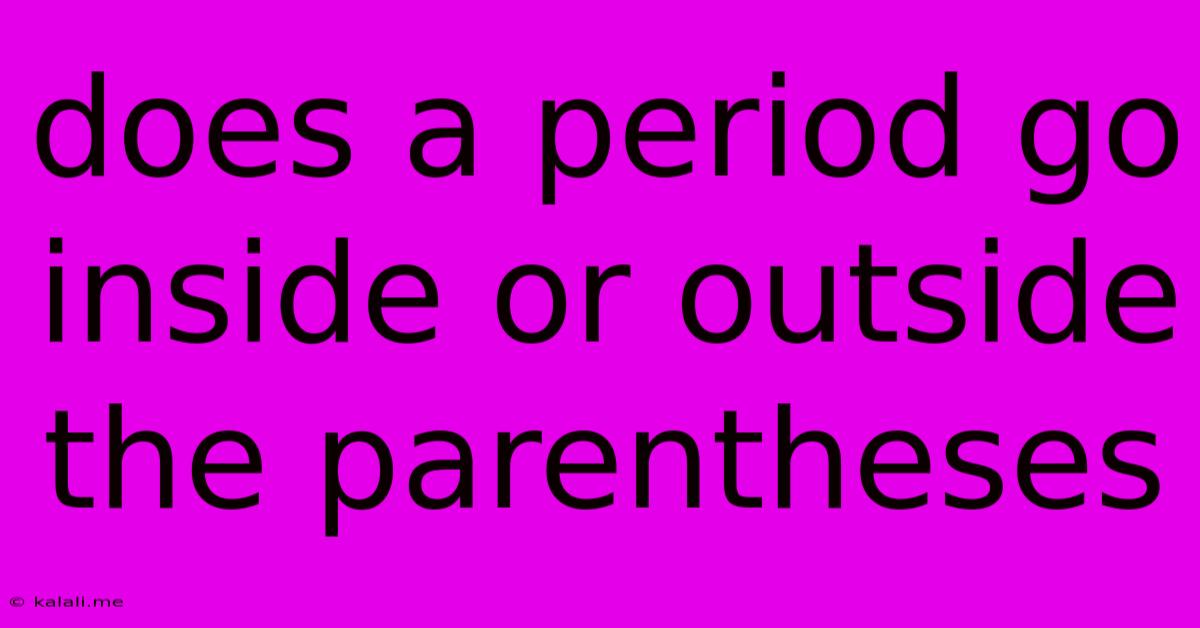Does A Period Go Inside Or Outside The Parentheses
Kalali
Jun 03, 2025 · 3 min read

Table of Contents
Does a Period Go Inside or Outside the Parentheses? A Definitive Guide
This seemingly simple question about punctuation—where to place a period in relation to parentheses—has sparked countless debates and confused writers for years. The answer, however, is surprisingly straightforward, though it depends on the context. This guide will clarify the rules and provide examples to ensure you always punctuate correctly.
The Basic Rule: Period Placement Depends on Sentence Structure
The placement of the period depends entirely on whether the parenthetical element is a complete sentence or a part of a sentence.
-
Parenthetical element is a complete sentence: The period goes inside the closing parenthesis.
-
Parenthetical element is not a complete sentence (phrase or clause): The period goes outside the closing parenthesis.
Let's break down each scenario with clear examples:
Scenario 1: Parenthetical Element is a Complete Sentence
When the information within the parentheses forms a complete sentence—containing a subject and a verb and expressing a complete thought—the period belongs inside the parentheses.
Example:
I went to the store. (I needed to buy milk.) We then went home.
Notice how "(I needed to buy milk.)" is a complete sentence. It has a subject ("I") and a verb ("needed"). Therefore, the period is placed inside the closing parenthesis.
Scenario 2: Parenthetical Element is Not a Complete Sentence
If the material within the parentheses is a phrase, a clause that doesn't form a complete sentence, or simply adds extra information to the main sentence, the period should be placed outside the parentheses.
Examples:
I went to the store (to buy milk) and then went home.
The meeting (which was scheduled for 2 PM) was postponed.
My favorite color is blue (a calming shade).
In these examples, the parenthetical elements are not complete sentences; they are phrases or clauses that modify the main clause. Therefore, the period remains outside the closing parenthesis.
Addressing Common Confusion and Exceptions
Sometimes the rules can seem ambiguous, especially with complex sentence structures. Here are a few points to keep in mind:
-
Multiple Sentences in Parentheses: If you have multiple sentences within parentheses, each sentence within the parentheses will have its own internal punctuation. The final period goes inside the closing parenthesis.
-
Abbreviations and Numbers: The rules remain the same. If the parenthetical information is a complete sentence containing an abbreviation, the period goes inside the closing parenthesis. Similarly for numbers and other elements.
-
Consistency is Key: Maintaining consistent punctuation throughout your writing is crucial for clarity and readability. Sticking to these rules will help you achieve consistency.
-
Referencing Specific Styles: Different style guides (like APA, MLA, Chicago) might offer slightly nuanced guidance. However, the core principles remain relatively consistent across most styles.
By understanding the fundamental rule and applying it thoughtfully, you can confidently handle punctuation within parentheses and improve the overall quality and professionalism of your writing. Remember, clarity is paramount, and correct punctuation significantly aids in this goal. Therefore, paying attention to the completeness of the parenthetical sentence is the key to mastering this seemingly minor yet vital aspect of writing.
Latest Posts
Latest Posts
-
What Does The Bible Say About Touching Breasts Before Marriage
Jun 05, 2025
-
How To Get Gum Out Of Rug
Jun 05, 2025
-
How To Make Potions Last Longer Minecraft
Jun 05, 2025
-
Elevator Wont Go To Floor After Pressing Button
Jun 05, 2025
-
What Were The 11 Involvements In Acts Of The Apostles
Jun 05, 2025
Related Post
Thank you for visiting our website which covers about Does A Period Go Inside Or Outside The Parentheses . We hope the information provided has been useful to you. Feel free to contact us if you have any questions or need further assistance. See you next time and don't miss to bookmark.